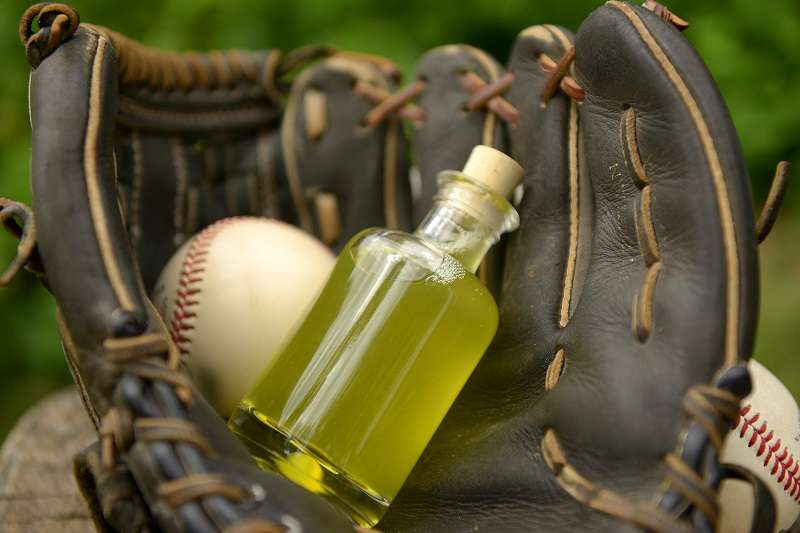Congratulations! You just bought a brand new Catcher’s Mitt. What next? What’s the best way to get your mitt game ready? This guide covers the best and most effective methods to Break in a Catcher’s Mitt.
Breaking in your catcher’s mitt can be difficult, especially if it’s brand new, and everyone seems to have their own “best way”. And while there isn’t just one way to do it, these methods have varying degrees of success, with some being more effective than others. I love the feel of a stiffer glove and replace it once it starts to get soft & flimsy.
Here, is the good, the bad & the ugly when it comes to breaking in your catcher’s mitt.
THE BEST WAY TO BREAK IN YOUR CATCHER’S MITT
Play Catch With It

Depending on the brand/model, breaking in your catcher’s mitt may be difficult & may take time. Many of the best catcher’s mitts will be difficult to break in since they use the best leather quality. Even so, this also means that they last longer.
But, this is by far the best way to break in a catcher’s mitt. It allows your glove to be broken into your hand’s exact shape and forms it in the way you catch. It also allows the glove to form exactly how you want it.
Don’t do anything to your glove that you wouldn’t do to your best friend.
HOW TO BREAK IN A CATCHER’S MITT QUICKLY
Unnatural break-in methods aren’t for me, but you can try them out if you don’t mind taking the risk. The methods described below are best used:
- On a cheap glove (under $100)
- If you need your glove broken and ready for play immediately
- If you don’t mind having to buy a new catcher’s mitt after only a season or two.
However, if you’re buying a top of the range catcher’s mitt, there are no shortcuts – playing catch with it is the safest way. A glove that’s well taken care of can last a lifetime.
Remember, these methods may shorten your glove’s life.
Use a Mallet
This method is ideal for taking out some aggression on your glove by beating the crap out of it. Using a mallet to hit the glove in key spots helps to soften the leather and form the pocket. Just don’t over-do it.
- Get yourself a glove mallet
- Wear our glove as you normally would
- Use your throwing hand to pound the glove pocket or the back of the glove as need be.
While using a mallet to break in your glove may speed up the break-in process, your glove is better off if the abuse is avoided. Play lots of catch to work in your glove fully – this is better for your glove in the long run.
Steaming
If you need to break in a cheap glove quickly, steaming could work. This method serves to soften the leather. Unfortunately, steaming isn’t a natural break in method and doesn’t form the glove in your hand’s shape.
- Soak a towel/cloth in hot water. Wring out the excess water and thoroughly wipe down the glove.
- Play catch with it while the glove is still damp to form the pocket. Do this for about a week or so.
- After a week, while dry, oil the glove up.
Shaving Cream
Lanolin-based shaving creams aren’t as bad for your glove as oils are. Unlike oils, lanolin-based shaving cream won’t soak into the leather and make it heavier.
For this method, apply the shaving cream to your glove with your bare hands, making sure to do it in moderation. Please start with the palm’s stiffer areas, working it evenly into other areas of the glove, like the inside.
This method is not as effective and is best used with an additional break-in method. After application, pound the glove using a mallet to break it in even further.
HOW NOT TO BREAK IN YOUR CATCHER’S MITT

What NOT to do. Below are some methods we would never think of trying on our precious gloves. We advise you to steer clear as well. While these have sometimes worked for others, they are far too risky to try on your precious brand new glove.
Microwave It
Never put your glove in an oven or a microwave. Like Ever. While this is one of the more popular ways to break in your glove, it can do irreparable damage.
Putting your glove in a microwave or an oven will dry out the leather and cause the laces to dry out, causing them to break. Not to mention the risk of burning your house down if left unattended, or if the glove has metal bits.
Drive Your Car Over It
Imagine spending a couple hundred dollars on one of the best catcher’s mitts money can buy, then running a 2000-pound car over it. Insanity!
Additionally, do not leave your mitt inside your car. Much like nuking it in a microwave oven, leaving your catcher’s mitt in a hot car may dry out the leather and make the laces brittle & may cause them to snap.
Tie It up
Putting a ball in your mitt, tying it up with some string and putting it under your mattress is another method we don’t recommend.
As much as this may help create a pocket, it is an unnatural way to break-in your catcher’s mitt, and it might not close as you want it.
Use Oils
While oils and conditioners help soften leather catcher’s mitts, they sit in the mitt, making it heavier. Moreover, they break down the leather over time, causing the laces to tear.
If you do choose an oil to break in your catcher’s mitt, use only manufacturer-suggested products. Steer clear of products such as petroleum jelly, olive oil or any other products that may damage the leather or dry it out.
Additionally, don’t douse it in oil. Although this isn’t a break-in method on its own, opinion varies as to whether you should use oils and other lubricants.
Apply a light coat, and add more if you need to. The oil helps keep the leather on your catcher’s mitt “alive” and keeps it soft.
To apply oil to your catcher’s mitt;
- Remove any dirt using a clean, dry cloth.
- Use a sponge, cloth, or bare hands to rub a small amount of conditioner into your mitt.
- Work it evenly into the laces, the web, the palm, or any other dry areas or starting to crack.
Do not apply the conditioner directly, as there will be too much of it on your starting point. Ensure you get the laces as well so that they don’t dry out and crack.
Important Points to Remember:
Keep in mind that leather is no different from your skin, and should be treated as such.
- The best way to break in your catcher’s mitt is to play catch with it.
- Putting too much conditioner/oil may ruin or shorten the life of your new mitt.
- Do not use any oils or conditioners that may cause the leather to dry up and become brittle.
- Water will dry out the leather on your catcher’s mitt, causing it to crack and making the laces brittle.
- Gloves that take longer to break in have high-quality leather and last longer as a result.
The best catcher’s mitts don’t come cheap, so if you want yours to last a long time, you need to take good care of it. Are you looking for a catcher’s mitt? Check out our guide on the best youth catcher’s mitts.